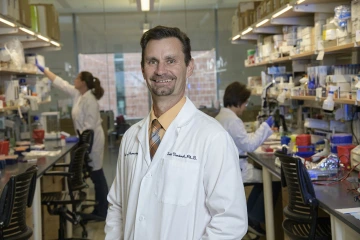New Training Program to Help Families, Children Affected by Opioid and Substance Use Disorders
The Comprehensive Pain and Addiction Center will oversee the first peer support experiential learning and apprenticeship program in rural Arizona.

PeerWORKS will be the first apprenticeship program to train behavioral health paraprofessionals in rural Arizona and the first to place trainees in integrated care settings.
A new University of Arizona Health Sciences workforce education and training program will address gaps in Arizona’s behavioral health system with a focus on individuals impacted by opioid and substance use disorders. Funded by a $2.2 million grant from the Health Resources and Services Administration, the Peer Support Workforce Training Program (PeerWORKS) will train peer support specialists to serve in integrated care facilities in rural and underserved areas in Arizona.

Todd Vanderah, PhD
“There is a growing body of evidence linking substance use disorders, and in particular opioid use disorder, to a history of traumatic experiences, particularly during childhood. Research has also demonstrated a correlation between childhood trauma and the development of chronic pain as adults, often resulting in higher rates of opioid pain medication use,” said Todd Vanderah, PhD, chair of the Department of Pharmacology in the UArizona College of Medicine – Tucson and director of the UArizona Health Sciences Comprehensive Pain and Addiction Center, which will oversee PeerWORKS. “PeerWORKS will be uniquely positioned to address the treatment gaps that impact the health of children, adolescents, transition-aged youth and families in Arizona.”
PeerWORKS will be the first apprenticeship program to train behavioral health paraprofessionals in rural Arizona and the first to place trainees in integrated care settings. Over four years, 84 people will be recruited and trained to join the behavioral health workforce as peer support specialists.
Peer support specialists are state-certified health professionals who are in recovery from a mental illness or substance use disorder and provide support to people experiencing similar issues. Legitimacy and trust are drawn from this “lived-experience.” Peers empower patients with a strengths-based approach to wellness, and evidence shows that peers improve patient experience, engagement and overall outcomes.
PeerWORKS trainees will participate in six-months of pre-service education through a telehealth-based training program, and half of the graduates also will complete a one-year apprenticeship at sites that serve rural and underserved communities in seven counties, including along the U.S.-Mexico border. Partnerships with Federally Qualified Health Centers, Rural Health Clinics and experiential learning sites will promote collaborative training through team-based models of care in integrated, primary care and interprofessional health settings.
“Arizona’s children are at higher risk for health and social problems, particularly in rural areas where there are fewer health care resources for families and children,” Dr. Vanderah said. “There is a critical need to train and expand a behavioral health workforce that understands and can relate to the unique needs of families and children in crisis, especially surrounding opioid and substance use disorders.”
The Comprehensive Pain and Addiction Center will oversee PeerWORKS, which is a collaboration between the College of Medicine – Tucson, the UArizona Mel and Enid Zuckerman College of Public Health, the Center for Rural Health and the Workforce Development Program. Dr. Vanderah worked with an interprofessional team to create PeerWORKS, including Randa Kutob, MD, MPH, in the College of Medicine – Tucson’s Department of Family and Community Medicine, Cheryl Glass, MBA-HCM, Jennifer S. De La Rosa, PhD, at the Workforce Development Program, and Benjamin Brady, DrPH, in the Zuckerman College of Public Health and Center for Rural Health.
PeerWORKS is expected to welcome its first class of paraprofessional trainees in early 2022.
Contact
Stacy Pigott
520-621-7239
spigott@arizona.edu

